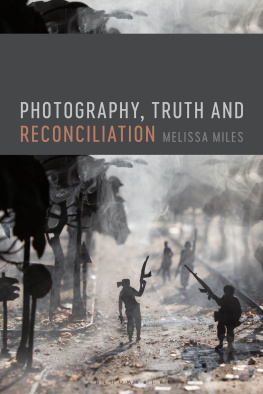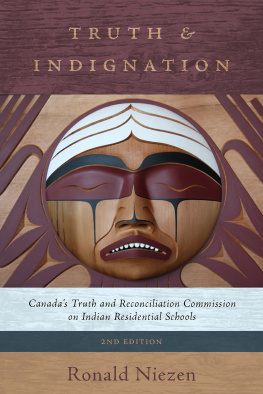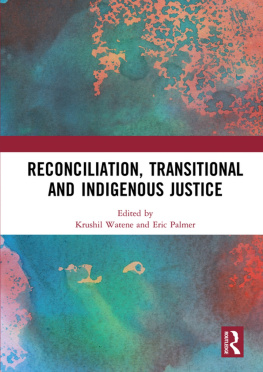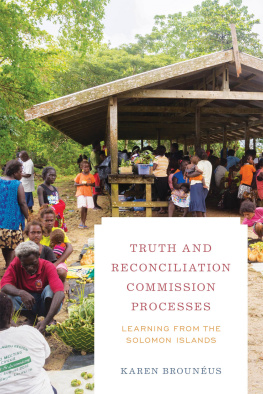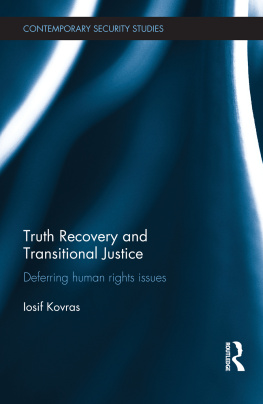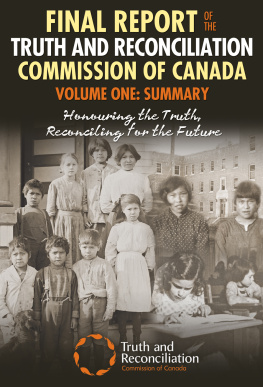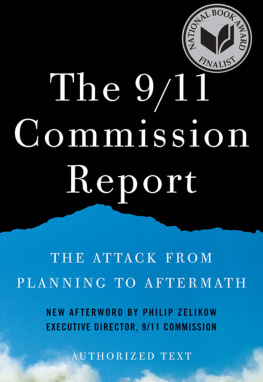Truth Commissions
PENNSYLVANIA STUDIES IN HUMAN RIGHTS
Bert B. Lockwood, Jr., Series Editor
Truth Commissions

Memory, Power, and Legitimacy
Onur Bakiner

Copyright 2016 University of Pennsylvania Press
All rights reserved. Except for brief quotations used
for purposes of review or scholarly citation, none of this
book may be reproduced in any form by any means without written
permission from the publisher.
Published by
University of Pennsylvania Press
Philadelphia, Pennsylvania 19104-4112
www.upenn.edu/pennpress
Printed in the United States of America
on acid-free paper
1 3 5 7 9 10 8 6 4 2
Library of Congress Cataloging-in-Publication Data
Bakiner, Onur, author.
Truth commissions : memory, power, and legitimacy / Onur Bakiner.
pages cm. (Pennsylvania studies in human rights)
ISBN 978-0-8122-4762-6 (alk. paper)
1. Truth commissionsPolitical aspectsCase studies. 2. Political crimes and offensesInvestigationCase studies. 3. ReconciliationPolitical aspectsCase studies. 4. MemoryPolitical aspectsCase studies. I. Title. II. Series: Pennsylvania studies in human rights.
JC580.B35 2016
323.4'9dc23
2015006392
CONTENTS

Truth Commissions
The National Theater of Guatemala City hosted an unusual crowd on February 25, 1999. The Commission for Historical Clarification, Guatemalas truth commission, was going to hand over its final report to the nations president, lvaro Arz, before an audience of high-ranking civilian and military officials and a number of victims groups and human rights organizations. Members of the political elite must have been comfortable enough, thinking that the truth commission, systematically deprived of resources and juridical powers to carry out its mandate, would present relatively uncontroversial results. However, the chair of the truth commission, Christian Tomuschat, took the stage to present the findings that little by little took the comfort away from political leaders: findings that referred to some of the atrocities the military committed against the Mayan population during the civil war as acts of genocide; findings that excited the victims groups in the audience to such an extent that they began to clamor for justicia! At the end of the ceremony President Arz, surprised and upset, refused to take the commissions final report directly from Tomuschats hands and sent his peace secretary to receive the report instead.
South Africas famous Truth and Reconciliation Commission was facing accusations of bias since its inception. Opposition figures kept insisting that the African National Congress (ANC) established the panel to discredit political rivals and impose its interpretation of history as the official truth. When the commission completed its task, the expectation was that ANCs opponents, especially the members of the outgoing apartheid regime, would object to the final report, while the ANC would endorse it wholeheartedly. The opposition did not surprise the observers. However, some sectors within the ANC leadership, disappointed to learn that the commission had implicated their movement in past atrocities, sought a last-minute political maneuver to prevent the final report from getting published. It was only Nelson Mandelas personal intervention in favor of the commission that saved the report.

Political-institutional mechanisms to come to terms with the past have swept across the globe since the early 1980s. Pieces of the past flew out of dusty archives, echoed in prison walls and presidential palaces, and erupted onto the political stage, sometimes through the choking voice of an old woman searching for a lost son, other times in the solemn words of a politician apologizing for past wrongs, and yet other times in the form of angry protests against the unpatriotic human rights defenders. Although it does not enjoy the status of universal consensus, the demand that every polity confront its past in an open-minded and critical fashion has become widely accepted. Human rights violators in Argentina and Rwanda, Guatemala and Serbia, face domestic or international courts; legislatures all around the world recognize genocides and impose punitive measures against denial; governments apologize for past abuses to rectify historical injustice; and victims receive material and symbolic reparations in many countries. All these measures address but a fraction of all political violence and human rights violations, and the forces of impunity and amnesia still prevail in most cases, but, arguably, individual and civil society advocacy in the wake of atrocities elicits official responses at a greater rate than any other period in human history.
One novel institution that appears to embody this zeitgeist of coming to terms with the past is called the truth commission. Incoming democratic governments have been establishing truth commissions since the early 1980s to investigate grave human rights violations committed under previous regimes. Even after the third wave of democratization ebbed, consolidated democracies like those in Uruguay and South Korea and reformist authoritarian regimes such as the one in Morocco resorted to truth commissions to set the historical record straight.
A glance at the news over the last few years shows that truth commissions are here to stay. Cte dIvoire and Thailand established truth commissions in 2010 and 2011 respectively to examine recent political violence; Venezuelas government and opposition agreed to do the same in early 2014.
Of course, not every truth commission initiative ends in success. Civic groups and legislators have recently proposed to establish commissions, to no avail, in settings as diverse as Indonesia and the United States, Mexico and Turkey. Nepals Supreme Court blocked an attempt to establish a truth commission in 2013 out of fear that such a panel would grant amnesties for serious crimes. A similar proposal met the same fate at the hands of the Legislative Assembly in Bolivia the same year. Yet, even failed attempts reveal the extent to which this institutional response to past atrocities (and disagreements over the meaning of truth, justice, memory, reconciliation, recognition, and forgiveness) has become central to the political controversies of today.
The introductory anecdotes from Guatemala and South Africa point to a simple fact: truth commissions are political, that is to say, they are sites of contestation over material and symbolic resources. Outgoing and incoming politicians, government and opposition parties, victims groups, human rights organizations, transnational advocacy networks, the judiciary, state security institutions, rebel groups, and the media participate in truth commission processes to achieve multiple, and often contradictory, objectives. The fact that commissions are the stage on which the complexity of interests, incentives, and values associated with nation building and truth telling is played out does not mean that commissioners and the staff simply replicate the political and ideological struggles taking place in society. Commissions are attentive, but not servile, to the broader political context. What makes them essentially political is that the commissioners and the staff constantly make choices when they define such basic objectives as truth, reconciliation, justice, memory, reparation, and recognition, and decide how those objectives should be met and whose needs should be served. Inevitably there will be winners and losers in a truth commission process. Thus, assessing the achievements and shortcomings of truth commissions requires identifying the complex set of actors, interests, values, and expectations that play into the politics of truth commissions and also recognizing commissions agency as a crucial factor.
Next page

